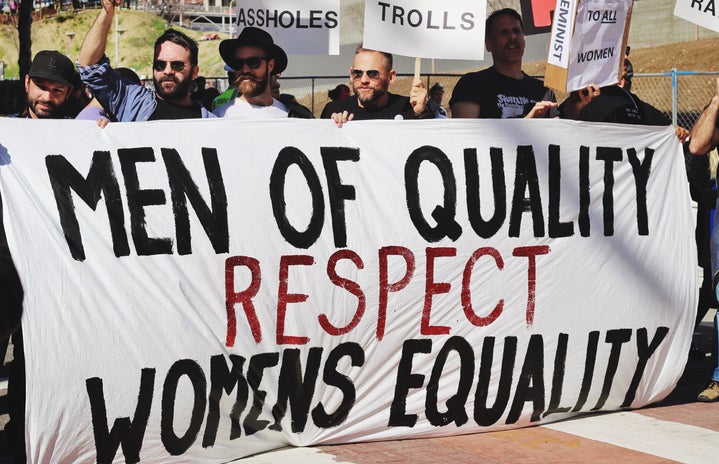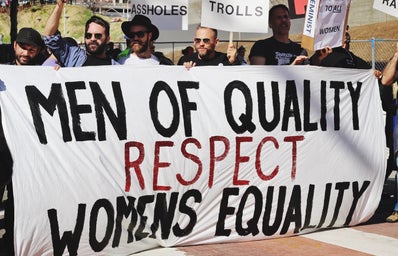At least 125 women have been killed in the UK since Sarah Everard was murdered just over a year ago – so let’s talk about what we can do to continue the fight against the very real and very active female violence still happening on our streets and behind closed doors today.
What is an ally?
An ally is someone who recognises the privileges in their own lives and act on social injustice by taking responsibility to support others and help end systemic issues. Men can be allies to women by recognising their own history of oppressing women and use their power as a tool to advocate for change. To be a successful ally, you should be supporting others, recognise micro-aggressions, listen to others experiences without seeing it as a personal attack and be open to self-reflection and change.
How to be an ally to women
We all have women we love in our lives – our mothers, sisters, daughters, cousins, aunts, grandmothers… so why can’t we get enough support for women? A study by the UN Women UK released a report which found that 97% of women in the UK aged 18-24 had been sexually harassed. This time last year in the wake of the murder of Sarah Everard and global outcry to combat violence against women, there was the anti-feminist and completely insensitive ‘not-all-men’ trend. When I saw this on social media, I was disgusted, not to mention the complete lack of support shown from my male counterparts – not just through social media awareness, but even through the lack ability to check up on the women in their lives. Just because you do not identity yourself as part of the problem, just because it isn’t ‘all men’ it doesn’t mean you should remain silent. Everyone must be involved in the fight against misogyny, rape culture and violence toward women… not all men are rapists – but all women know of or have been affected by sexual harassment and assault and have a very valid justification to be afraid of men. When you say, ‘not all men’ what you’re really saying is ‘your feelings are invalid, I’m a good person therefore it isn’t my problem’. That is exactly the mindset that allows violence toward women to continue. Therefore, men must partake in the fight against violence against women and here’s a few ways that you could do just that.
Check up on the women around you
One of the most simple ways to be an ally is to talk to the women around you. Everyone has different experiences, and many may not want to share their experiences with you but being able to show that you are there to listen and support them in a non-judgemental and understanding way is vital. 96% of women have been found to not report their sexual harassment incidents and 45% of women saying they didn’t believe reporting would help change anything (UN Women). Showing women you are there to listen and take their experiences seriously, even if you don’t fully understand it, is the first step to becoming an ally.
Don’t be afraid to call out others
If you know someone – a friend or family member who is talking or acting inappropriately with a woman, the best way to be an ally is to challenge their behaviour. Men are in a privileged position to call out unacceptable behaviour, whilst women may not be able to raise these issues without fear of backlash or violence. This may be one of the most important roles a man can play as an ally to women, and by witnessing a friend or family member exhibiting or speaking violently and inappropriately about women only perpetuates the problem even further. Do not be a silent bystander, and certainly do not encourage this behaviour – be it a friend or stranger, you have the power to stop them and educate them on why it is wrong.
Self-reflect and self-educate
Make sure you are constantly self-reflecting on your own behaviour, not just the behaviour of the men around you. Although you may not be actively violent toward women, small actions such as listening more and speaking less (when having difficult conversations with women about their experiences), being aware of ‘mansplaining’, keeping conversations relevant and respectful (you certainly don’t have the right to comment on a women’s body or attire) and educating yourself on the misogynistic views you may inadvertently have are all indications that you are actively helping women and their safety.
Small changes in behaviour, realising your male privilege and taking accountability are all factors that lead us one step closer to fighting the battle against misogyny and the sexual and physical violence women have to face every day. Continue the conversation and continue the fight for women and girls’ safety.
Resources:
www.whiteribbonscotland.org.uk/make-your-pledge/


